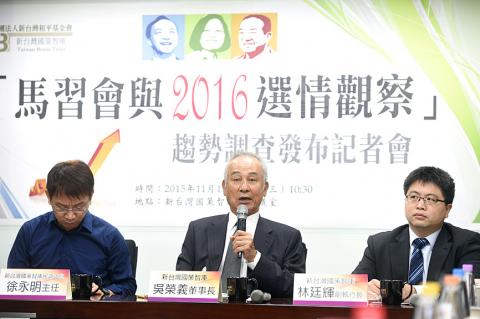The meeting between President Ma Ying-jeou (馬英九) and Chinese President Xi Jinping (習近平) earlier this month damaged support for the Chinese Nationalist Party (KMT) and boosted negative perceptions of China, especially among young people, a poll released yesterday showed.
Although most KMT politicians have described the Ma-Xi meeting as a positive move, a poll conducted by the Taiwan Brain Trust think tank indicated that the meeting led to a decreased approval rating of the party among pan-blue supporters.
According to the poll, the approval rating for the KMT dropped 1.2 percent from 20.8 percent in September to 19.6 percent, while the Democratic Progressive Party’s (DPP) approval rating showed a 0.3 percent drop from 42.3 percent to 42 percent.

Photo: George Tsorng, Taipei Times
However, the DPP’s disapproval rating dropped from 45 percent in September to 37.7 percent, making it the first time this year that the party’s approval rating surpassed its disapproval rating, the poll showed.
“The Ma-Xi meeting was the first time the leaders of Taiwan and China met,” Taiwan Brain Trust executive director Lee Ming-chun (李明峻) told a news conference. “The KMT’s approval rating dropped after the meeting, especially among pan-blue supporters, which went from 49.3 percent [in September] to 47 percent this time, showing that there are still anti-Communist pan-blue supporters who are disappointed by the Ma-Xi meeting.”
Although the Ma administration has worked over the past seven years to enhance the cross-strait relationship, 39.2 percent said they have a negative perception of China, with only 15.9 percent expressing a positive perception of the nation, while 36.1 percent said they have “no feelings” toward China, the poll showed.
The percentage having a negative perception of China went up by 1.9 percent from 37.2 percent in September, before the Ma-Xi meeting, while respondents who indicated “no feelings” dropped by 2.4 percent from 38.5 percent, it showed.
Those with a positive perception of China dropped by 2.8 percent from 18.7 percent, it showed.
In addition, 66.7 percent of respondents said that Taiwan is a sovereign and independent nation, while only 21.8 percent disagreed with the assertion, the poll showed.
In response to the question of whether Taiwan should become an independent nation or unify with China, 61.4 percent supported independence, while 12.3 percent opted for unification, the results showed.
As for self-identity, 87 percent of respondents identified themselves as “Taiwanese,” while 6.1 percent considered themselves “Chinese,” it said.
The poll indicated that people aged from 20 to 29 are notably more pro-independence than other age groups, with 81.9 percent of respondents in their 20s saying Taiwan should become an independent nation.
Ninety-eight percent of those in that age group identified themselves as “Taiwanese.”
The results showed that DPP presidential candidate Tsai Ing-wen (蔡英文) has 48.4 percent support, the KMT’s Eric Chu (朱立倫) has 20.4 percent, while the People First Party’s James Soong (宋楚瑜) has 9.3 percent ahead of Jan. 16’s election.
The poll was conducted on Friday and Saturday last week, with 1,108 valid samples collected.
It has a margin of error of 2.9 percentage points.

The Ministry of Economic Affairs has fined Taobao NT$1.2 million (US$36,912) for advertisements that exceed its approved business scope, requiring the Chinese e-commerce platform to make corrections in the first half of this year or its license may be revoked. Lawmakers have called for stricter enforcement of Chinese e-commerce platforms and measures to prevent China from laundering its goods through Taiwan in response to US President Donald Trump’s heavy tariffs on China. The Legislative Yuan’s Finance Committee met today to discuss policies to prevent China from dumping goods in Taiwan, inviting government agencies to report. Democratic Progressive Party Legislator Kuo Kuo-wen (郭國文) said

The Ministry of Economic Affairs has fined Taobao NT$1.2 million (US$36,900) for advertisements that exceeded its approved business scope and ordered the Chinese e-commerce platform to make corrections in the first half of this year or its license would be revoked. Lawmakers have called for stricter supervision of Chinese e-commerce platforms and more stringent measures to prevent China from laundering its goods through Taiwan as US President Donald Trump’s administration cracks down on origin laundering. The legislature’s Finance Committee yesterday met to discuss policies to prevent China from dumping goods in Taiwan, inviting government agencies to report on the matter. Democratic Progressive Party

Taiwan and its Pacific ally Tuvalu on Tuesday signed two accords aimed at facilitating bilateral cooperation on labor affairs, according to Taiwan’s Ministry of Foreign Affairs (MOFA). The governments inked two agreements in Taipei, witnessed by Foreign Minister Lin Chia-lung (林佳龍) and visiting Deputy Tuvaluan Prime Minister Panapasi Nelesone, MOFA said in a news release. According to MOFA, the agreements will facilitate cooperation on labor issues and allow the two sides to mutually recognize seafarers’ certificates and related training. Taiwan would also continue to collaborate with Tuvalu across various fields to promote economic prosperity as well as the well-being of their

Sung Chien-liang (宋建樑), who led efforts to recall Democratic Progressive Party (DPP) Legislator Lee Kun-cheng (李坤城), was released on bail of NT$80,000 today amid outcry over his decision to wear a Nazi armband to questioning the night before. Sung arrived at the New Taipei District Prosecutors’ Office for questioning in a recall petition forgery case last night wearing a red armband bearing a swastika, carrying a copy of Adolf Hitler’s Mein Kampf and giving a Nazi salute. Sung left the building at 1:15am without the armband and covering the book with his coat. Lee said today that this is a serious